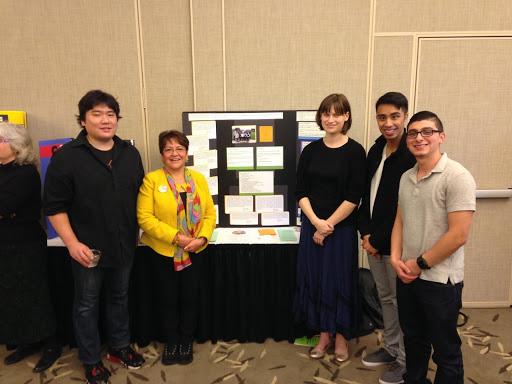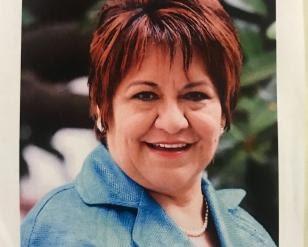Spotlight: Dr. Elisa Velasquez Case Study
Elisa Velásquez-Andrade, Ph.D. professor and the Department Chair for Psychology talked about what service-learning means to her. “My past experiences have helped me see people with the most needs and in my head, I constantly ask myself what I can do to help personally and what I can do with my students,” she says.
Dr. Velásquez-Andrade has been here at Sonoma since 1998 where she began as a professor but recently has been doing most of the chair responsibilities in the Department of Psychology. As a professor and a department chair she says, “I start thinking about what I can do, and having been the chair, I've been framing my service-learning as Sonoma State, and that is the community I am serving,” said Elisa. As a department chair, Dr. Velaquez tries to serve SSU as much as she can and now focuses on departments or groups on campus that don’t get as much attention. “We take a community that is unaddressed or underserved and we implement projects and my students do it,” she said.
Dr. Velasquez-Andrade first received her Bachelor's Degree in Psychology when she was studying at the National University of Mexico (UNAM). She also has a Ph.D. in Developmental Psychology, and an M.A. in Educational Psychology which she received from The University of Texas at Austin. During her time in Mexico, she was first exposed to service-learning and an education that helped her see real-life struggles. Her first experience with service-learning helped her see people with the most need and the most poverty which caused her to think constantly about what she can do to help in the future.
As a professor, she always tries to teach her students to the best of her ability, “my kind of learning is higher because you get to really experience it, this way I can empower them and I feel like they really get a lot out of it,” she says. One thing that separates Dr. Velasquez’s way of teaching from others is that rather than sending students to go out and experience service-learning by themselves, she actually goes and does it with them. “I never let my students go do things on their own, it’s unethical for me to send them because I need to expose myself to that environment as well,” she said. Kharissa Simms, a graduating 2020 student and someone who took many courses from Dr. Velasquez’s shared the following:
One of the things that I loved most about Dr.Velasquez's teaching style/classes was the opportunity to have hands-on experiences that could very well be applicable in the workforce. While in her class, I did not only learn the curriculum of the class, but I also learned how to be an outstanding human being (something I'm sure we can all be reminded of every once in a while). In addition, I love how every topic was taught in a way that encouraged us to relate the teaching to our personal experiences. Not only did this make the class relatable and interesting, but it also made the class feel relevant and necessary. Service-learning is the best learning in my opinion!

Dr. Elisa Velasquez and her students presenting
their work at an SSU event.
During a Career Fair one year, she went around and talked to a community agency called Friends Outside, which is a national organization that provides services to prison inmates. Dr. Vasquez introduced herself and asked if they had any need for data to let her know because she had funding and she wanted to help underserved populations. She met with the executive director and they told her they needed assessments for people who are in jail. The executive director was involved in the design of the project to ensure that necessary information needed to obtain funding to better serve this population was collected. She talked to her students and asked them how they felt about interviewing people in jail, as this is what the community partner needed. The students were very interested in doing this. She knew that it was a lot to ask from her students because they would be going to the jails and talking to inmates but she knew that it would be a good learning experience. “We developed a questionnaire addressing participants' developmental history, personal and environmental protective/risk factors, history of criminal behavior (inter/intra-generational), and sense of self-efficacy” she said.
Twenty-five inmates (14 women and 11 men, mean age = 33.8 years, age range = 23-51 years) were interviewed at the prison in Northern California. “At first, people were a little nervous but overall it was a very good experience and through this we developed a survey and were able to get a report of the needs of the people,” she said. For this project, students were able to interview inmates and learn more about them and their life in jail. Through the interviews they did, they found that participants reported permissive, neglectful, or abusive parenting; having unstable home environments; drug-related charges; and a need for other people to know that they are not bad people. This information can be used to improve and create programs for inmates and their children.
After they did the interviews a student told Dr. Velazquez, “this was very powerful, because by talking to the people here, I reflected on how close I was to being like the person I interviewed and take the same paths that they took but I didn’t, I am very grateful that I have people that helped me at the moment that helped change my life around,” she said. This is an example of how Dr. Velasquez looks for the best opportunities for her students and always tries to create meaningful projects that students will learn from as well as serve the community. “Commitment to this project resulted in students’ presentations (UCLA Undergraduate Research Conference and the Western Psychological Association), and research awards from the university” she said. The executive director of FO was very pleased with the students’ work as they were able to use the data from the final report to obtain funding.
Dr. Velasquez and her students also worked on creating bulletin boards on campus for Black History Month and Women's History Month. “We are constantly talking about the curriculum and how we can use it to help others,” she said.
Dr. Velasquez always does her best to implement service-learning in her psychology classes. She had a student who had different opinions towards the LGTQ community than most of the other students in her class. Dr. Velasquez told her that she appreciated someone else's perspective but told them to wait and see if their perspective changed throughout the semester. As the semester continued the student started going to Queer Student Alliance (QSA) meetings on campus, started having a different perspective, and began raising awareness in her community in support of the LGBT community. This student decided to collect 50 positive messages and hung the message on the trees that are in the Seawolf Plaza. A lot of students and faculty who walked by there were encouraged and motivated from seeing these messages. At the end of the semester in their final paper for the class, the student said, “I realized how conservative I was with everything, and I realized that’s the way I was raised, but now I will take what I learned and use it with my own kids.” Another student from her psychology class wrote on their final paper, “ Not only have I become more aware about the cultural community around me, I am more accepting of all the things I do not know.”
We are very lucky to have someone like Dr. Elisa Velasquez here on campus and congratulate her for all the hard work she does. We also appreciate the work of her students and community partners.



